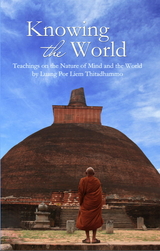
Within this little booklet are teachings on the nature of the mind and the world given by Luang Por Liem Thitadhammo. During a visit to Sri Lanka in March, 2013, Luang Por had this Dhamma discussion with the resident monastic community at Na Uyana Forest Monastery. The sincere interest in practising Dhamma and developing meditation led to practical and profound teachings on training the mind and understanding the world:
“….The guests that come to the monastery are only visitors, just like these visiting mental states that arise in our minds. Some make us laugh, some we delight in, while others bring up aversion and disappointment. When we see them from non-delusion, then we see it all as maya — as illusion and trickery, a system of deceiving….Know how to abandon the world. Know how to put it down.”
Luang Por explains that what we understand as the world is a misunderstanding. As a consequence of delusion we are overwhelmed with craving and attachment. Attaching to mental states and mind objects as ‘me’ and ‘mine’ makes us a victim of delight and aversion. This illusion of ‘self ’ and ‘belonging to self ’ arises from feeling and craving:
“….what we call the ‘Eight Wordly Dhammas’ arise from our sense of self-importance. Delight is a lokadhamma — this is sukha, or what we call happiness. Aversion is a lokadhamma, it’s dukkha — we don’t like it and we’re unhappy. See these lokadhammas as simply nature — things come, things go. The guests come and they go — it’s not their residence. For what do we go delighting and getting angry about?….‘Rupa, vedana, sañña, sankhara and viññana — having arisen they cease’. Seen in this way, everything is empty.”
